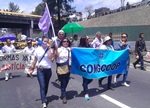Social Watch News
|
Published on Fri, 2016-08-12 19:01
|
Published on Fri, 2016-08-12 18:59
The main challenge in implementing the 2030 Agenda in Finland will be integrating the principles and targets of sustainable development into all of the country's domestic policies, including those policies related to developing countries. Genuine political commitment is a prerequisite for implementing the 2030 Agenda broadly and coherently throughout the public administration. Different stakeholders have to be engaged and also take responsibility for implementing the goals. Implementation has to be monitored not only globally but also regionally.
This requires sufficient planning, coordination and allocation of resources, which in turn requires political commitment to implementing the universal goals but also prioritizing policy actions in order to get a serious and efficient start. Committing to the goals means that attaining them is mainstreamed into all decision-making, and not just considered in a separate action plan. It is important to understand the 2030 Agenda in a holistic way, so that for example gender equality is not only a separate goal but also a cross-cutting theme.
|
Published on Fri, 2016-08-12 18:56
The incorporation of the 2030 Agenda and the SDGs into the national development plan-- Eleventh Malaysia Plan 2016-2020 –and Malaysia’s approach to the SDGs demonstrate the same neoliberal biases, aims and agenda of all development plans since 2009. Will it belie the same fetishes for GDP or market/corporate stratagems instead of real socio-economic development plans? Does it package structural adjustment and austerity plans in the guise of ‘rationalizing’ and ‘integrating’ limited resources, funding and collaborative programmes? Will the imaginary crisis of a ‘middle-income trap’ continue to occupy the policy agenda, as opposed to the real crisis of the increasing income divide between the few who have and the many who have not?
|
Published on Fri, 2016-08-12 12:30

(Photo: UN)
|
Vulture funds are inherently exploitative, since they seek to obtain disproportionate and exorbitant gains at the expense of the full realization of human rights, particularly economic, social and cultural rights, and the right to development, the UN Human Rights Council Advisory Committee has said.
In its latest report on the activities of vulture funds and their impact on human rights, the Advisory Committee said that seeking the repayment in full of a sovereign debt from a State that has defaulted, or is close to default, is an illegitimate outcome.
|
Published on Fri, 2016-08-12 12:15
 |
A fundamental distinction that has come to the foreground with the onset of the economic crisis has been between the European Union (EU) rules and those of the Council of Europe. Indeed, the study of human social rights at the European level must include this dual perspective. That is because the European Social Charter Treaty (“the Charter” or “the ESC”), adopted within the Council of Europe, allows individuals to demand rights that are being violated by quite restrictive tax, labor, commercial and other legislative reforms and measures being imposed as a requirement by some European community institutions. These are, in particular, those that are part of the troika (which comprises the International Monetary Fund, the European Commission and the European Central Bank). The measures come attached to financial assistance being received by some countries in order to overcome the situation of bankruptcy in which they find themselves, or are the consequence of some rulings by the Court of Justice of the European Union.
|
Published on Fri, 2016-08-05 12:10
Can France be labeled as “developed” when 8 percent of the population lives in poverty and its mode of consumption and production are depleting the resources of the planet? Countries should not be rated only by GDP but also by their environmental sustainability and access to human rights for all of their citizens. Even though France is the world's sixth largest economy, poverty is widespread in the country and extreme poverty is persistent. Many people have to endure the violence of poverty and inequalities weaken social cohesion and democracy.
Regarding international responsibility, France's contribution to Official Development Assistance (ODA) is actually far from the 0.7% of the GNP which was pledged decades ago. In 2010 ODA was only 0.50 percent and dropped to 0.37 percent in 2015. Financial support from the richest countries to the poorest is indispensable to the achievement of SDGs. There is a gap between words and acts.
|
Published on Fri, 2016-08-05 12:06

Photo: CONGCOOP.
|
Guatemala reached the 2015 deadline for achieving the Millennium Development Goals (MDGs) without achieving a single one. To meet the 17 Sustainable Development Goals (SDGs) agreed in the 2030 Agenda for Sustainable Development, it is essential that social organizations play an important role. But this will only be possible if social action is matched by state and political will, which must be expressed in political and budgetary changes.
So far, the state has expressed only good wishes. A long list of shortcomings frames the barely positive scenario outlined to comply with the SDGs in Guatemala. If these great challenges are not faced by taking the necessary actions, the state will not meet the demands of the population and the SDGs will not be met by 2030 either.
|
|
Published on Fri, 2016-08-05 11:53
|
Published on Thu, 2016-08-04 15:16
The ILO Social Protection Floors Recommendation No. 202, unanimously adopted by 184 members of the International Labour Conference in 2012, provided for the first time concrete content to the abstract right to social security.
Recommendation 202 was born out of a desire to protect the vulnerable from the consequences of the Global Financial Crisis (GFC). It was one of the nine UN crisis initiatives agreed upon between the heads of all UN agencies in April 2009, time by when it had become obvious that, barring decisive action, ultimately the poor, the sick and disabled, the old and the unemployed would have to bear the lion’s share of the economic burden unleashed by the crisis. But, perhaps unintendedly, it helped define the right to social security, carrying important consequences for financial and fiscal policy.
|
Published on Thu, 2016-08-04 15:08
From 11-20 July 2016, the 2016 meeting of the High-Level Political Forum on Sustainable Development (HLPF) took place at UN Headquarters in New York. Under the auspices of the UN Economic and Social Council (ECOSOC), the meeting focused on the theme of “Ensuring that no one is left behind.” It was attended by nearly 1500 Member States, Major Groups and other stakeholders (MGoS), and intergovernmental and UN organizations. In addition to the official program, 37 side events were organized.
According to the Rio+20 outcome document and G. A. Resolution 67/290, the HLPF has the mandate to follow-up and review the 2030 Agenda for Sustainable Development and the Sustainable Development Goals (SDGs). Since this was the first meeting after the adoption of the SDGs, 22 countries offered voluntary reviews to the implementation of the goals, focusing mostly on how countries are preparing for and managing their transition towards the implementation of the 2030 Agenda.
|
SUSCRIBE TO OUR NEWSLETTER
Submit

|









